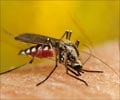Limiting global warming to 1.5oC as set by the Paris Climate Agreement could reduce the number of dengue fever cases by up to 3.3 million cases per year.
- More than three million cases of dengue in Latin America and the Caribbean could be avoided if global warming rise is limited to 1.5oC, says a new study.
- The UN Paris Climate Agreement has set a goal of capping global warming to well below 2oC and to pursue efforts to limit the increase to 1.5oC further.
- The current study is the first of its kind to show that reductions in warming from 2°C to 1.5°C could have important health benefits.
Lead researcher Dr. Felipe Colón-González, from UEA’s School of Environmental Sciences and the Tyndall Centre for Climate Change Research, said: "There is growing concern about the potential impacts of climate change on human health. While it is recognised that limiting warming to 1.5°C would have benefits for human health, the magnitude of these benefits remains mostly unquantified. "This is the first study to show that reductions in warming from 2°C to 1.5°C could have important health benefits."
The UN Paris Climate Agreement has set a goal of limiting the temperature increase in this century to well below 20C and to pursue efforts to further limit the increase to 1.5oC above pre-industrial levels.
Study
The team studied dengue reports that were confirmed by clinical and laboratory tests in Latin America. Computer models were used to predict the impacts of global warming under different climate scenarios.Dengue is more common in tropical countries as the mosquitoes that transmit the virus to humans thrive in warm and humid conditions.
Results of the study
Limiting warming further to 1.5°C will cause a further drop of up to half a million cases per year, reducing the number by around 3.3 million cases per year.
Brazil can avoid up to half a million cases per year by the 2050s and 1.4 million cases per year by 2100 if the warming is limited to 1.5°C.
The team also found that limiting global warming would stop the spread of the disease to areas where the incidence is currently low, such as Paraguay and northern Argentina.
Co-author Dr. Iain Lake, also from UEA, added: "Understanding and quantifying the impacts of warming on human health is crucial for public health preparedness and response. Warming has already reached 1°C above pre-industrial levels, and the current trajectory, if countries meet their international pledges to reduce CO2, is around 3°C - so clearly a lot more needs to be done to reduce CO2 and quickly if we are to avoid these impacts."
Dengue
Dengue is caused by the dengue virus (DEN) and is transmitted to humans by the bites of the infective female Aedes aegypti mosquito. Dengue is a fast emerging pandemic-prone viral disease that has increased 30-fold over the last 50 years. It is endemic in over 100 countries that are situated mostly in Asia, Latin America, and the Caribbean. The disease has become a leading cause of hospitalization and death among children and adults in these regions.Symptoms of dengue are fever, headache, muscle and joint pain. Sometimes the virus can cause a potentially lethal complication called severe dengue or dengue hemorrhagic fever.
There is no specific treatment or vaccine for dengue as of now, and in rare cases, it can be lethal.
References:
- Dengue control - (http://www.who.int/denguecontrol/disease/en/)
- Dengue Fever - (https://www.mayoclinic.org/diseases-conditions/dengue-fever/symptoms-causes/syc-20353078)
Source-Medindia














